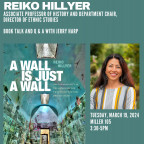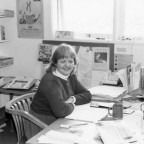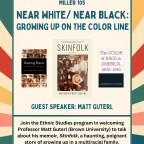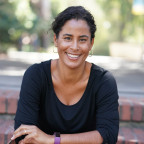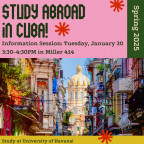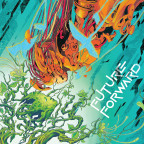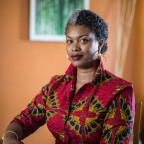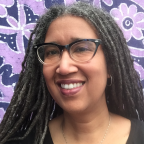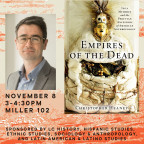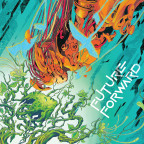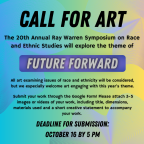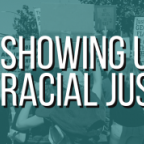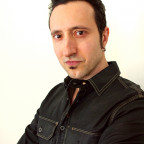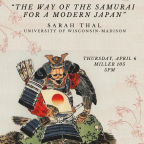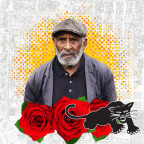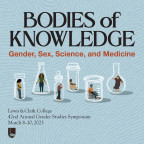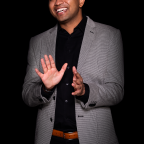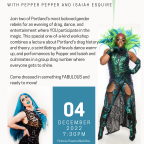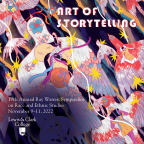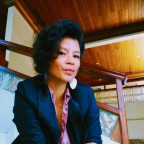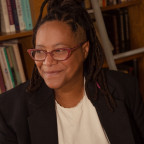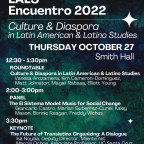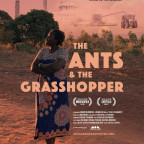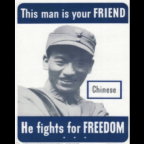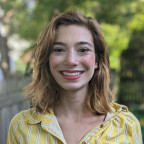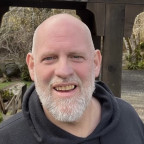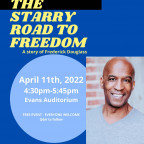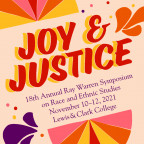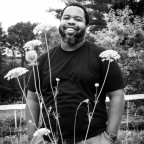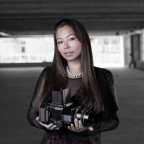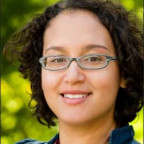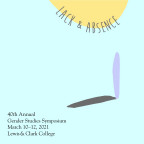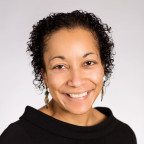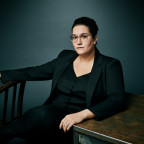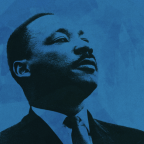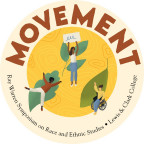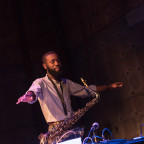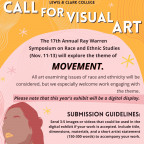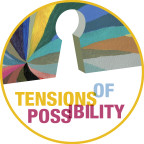Join Vietnamese Portland for a rough cut work-in-progress screening of ‘Mai American’ by Kevin Truong
Vietnamese Portland: Memory, History, Community invites you to a rough cut work-in-progress screening of Mai American, a documentary by Kevin Truong. Join us on Thursday, April 4 at 5 PM in Miller 102 for a screening of the 90-minute cut and a Q&A with Kevin.
Social Justice Tour: April
The Inclusion & Multicultural Engagement (IME) office presents the Social Justice Tour.
“A Wall is Just a Wall”: Reiko Hillyer in Conversation with Jerry Harp
Please join Associate Professor of History and Department Chair Reiko Hillyer discuss her latest book, A Wall is Just a Wall: The Permeability of the Prison in 20th Century America (Duke University Press, February 16, 2024) in conversation with Jerry Harp. Influenced by her work teaching in the Inside-Out program, Hillyer traces the decline of practices that used to connect incarcerated people more regularly to the free world.
Call for Papers: 2024 Dorothy Berkson Writing Award in Gender Studies
Submissions due by 5pm, Wednesday, March 13, 2024
Submission may be from any field of study so long as gender is central to the work.
2024 Gender Studies Symposium–Day 3
Day 3 of the 43rd Annual Gender Studies Symposium!
This year’s symposium focuses on the ways in which digital technology, internet platforms, and online spaces have shaped and been shaped by understandings and expressions of gender and sexuality.
Join us for three days of keynote presentations, multidisciplinary panels, workshops, readings, and other events, as well as an art exhibition. View the complete event schedule for details.
2024 Gender Studies Symposium–Day 2
Day 2 of the 43rd Annual Gender Studies Symposium!
This year’s symposium focuses on the ways in which digital technology, internet platforms, and online spaces have shaped and been shaped by understandings and expressions of gender and sexuality.
Join us for three days of keynote presentations, multidisciplinary panels, workshops, readings, and other events, as well as an art exhibition. View the complete event schedule for details.
Near White/Near Black: Growing Up on the Color Line
Join the Ethnic Studies program in welcoming Professor Matt Guterl (Brown University) to talk about his memoir, Skinfolk, a haunting, poignant story of growing up in a multiracial family.
60th Anniversary Arthur L. Throckmorton Lecture: Kelly Lytle Hernández on “Million Dollar Hoods: Using Maps, Data, and Archives to End Mass Incarceration in Los Angeles”
Los Angeles County operates the largest jail system in the United States, which incarcerates more people than any other nation on Earth. At a cost of nearly $1 billion annually, more than 20,000 people are caged every night in L.A.’s county jails and city lockups. But not every neighborhood is equally impacted by L.A.’s massive jail system. In fact, L.A.’s nearly billion-dollar jail budget is largely committed to incarcerating many people from just a few neighborhoods. In some communities, more than one-million dollars is spent annually on incarceration. These are L.A.’s Million Dollar Hoods.
Led by Prof. Kelly Lytle Hernández, the Million Dollar Hoods (MDH) research team maps and monitors how much local authorities spend on locking up residents in L.A.’s Million Dollar Hoods. Led by Black and Brown women and driven by formerly-incarcerated persons as well as residents of Million Dollar Hoods, the MDH team also provides the only full and public account of the leading causes of arrest in Los Angeles, revealing that drug possession and DUIs are the top booking charges in L.A.’s Million Dollar Hoods. Collectively, this data counters the popular misunderstanding that incarceration advances public safety by removing violent, serious offenders from the streets. In fact, local authorities are investing millions in locking up the County’s most economically vulnerable, geographically isolated, and racially marginalized populations for drug and alcohol-related crimes. This talk provides an introduction to the Million Dollar Hoods project, method, and impact.
Social Justice Tour: February
The Inclusion & Multicultural Engagement (IME) office presents the Social Justice Tour.
Information Session: Study Abroad in Cuba Spring 2025!
LC students are welcome to attend the Spring 2025 Study Abroad in Cuba information session.
Students study at the University of Havana, visit Viñales, Trinidad, and Santa Clara, and experience individual homestays.
This LC Overseas Program counts for Latin American and Latino Studies, Hispanic Studies (with appropriate language level), and Global Perspectives Gen Ed.
Faculty Leader: Professor Elliott Young (History)
Prerequisites: Spanish 202 (with at least a B) and Modern Cuban History (offered Fall 2024).
Race Monologues: 20th Annual Ray Warren Symposium on Race and Ethnic Studies
Join us at the concluding event of the 20th Annual Ray Warren Symposium on Race and Ethnic Studies: Race Monologues
Each year a different group of L&C students writes an original series of personal narratives to share their feelings, experiences, and understandings of race, ethnicity, and identity.
Learn more about the history of Race Monologues and see the full list of this year’s keynote speakers, art exhibit, and event schedule.
20th Annual Ray Warren Symposium on Race and Ethnic Studies Nov. 8-10, 2023
This year’s Ray Warren Symposium on Race and Ethnic Studies is titled Future Forward, and revolves around reimagining society to build a liberating and just future.
Join us for three days of keynote presentations, panels, workshops, and other events exploring what it means to integrate BIPOC futurism(s) into the world we create, whether fantastical or real.
Details on the symposium website.
Ray Warren Symposium Keynote Speaker Ingrid LaFleur
Please join us at the 20th Annual Ray Warren Symposium on Race and Ethnic Studies for a keynote presentation by Ingrid LaFleur:
Preparing for Afrotopia
Presentation abstract: How do we prepare for a collective future if anti-Blackness continues to haunt us? How do we trust the future vision being created? What tools do we need to not only anticipate the future also shift its direction? These are the questions central to Ingrid LaFleur’s current research and justice-oriented experimentation. For her keynote, LaFleur will journey the nonlinear pathways to achieving decolonized futures and discuss the steps to building an afrofuture that serves humanity and their ecological home.
ASL interpretation will be provided.
Remote streaming will be available at the Zoom link posted to the symposium website. No registration is required to attend in person or stream remotely.
After the talk, please join us for a reception in the Council Chamber foyer.
20th Annual Ray Warren Symposium on Race and Ethnic Studies Nov. 8-10, 2023
The 20th Annual Ray Warren Symposium on Race and Ethnic Studies is titled “Future Forward” and revolves around reimagining society to build a liberating and just future.
Join us for three days of keynote presentations, panels, workshops, and other events exploring what it means to integrate BIPOC futurism(s) into the world we create, whether fantastical or real.
Ray Warren Symposium Keynote Speaker Aya de León
Please join us at the 20th Annual Ray Warren Symposium on Race and Ethnic Studies for a keynote presentation by Aya de León, an award-winning writer, speaker, and advocate whose work is at the intersection of social identity and climate justice.
The Apocalypse Is Not Coming: Afrofuturism vs. the Climate Crisis
ASL interpretation will be provided.
Remote streaming will be available at the Zoom link posted to the symposium website. No registration is required to attend in person or stream remotely.
After the talk, please join us for a book signing in the Council Chamber foyer. The speakers’ books will be available for purchase.
“Empires of the Dead” with Christopher Heaney
Sponsored by LC History, Hispanic Studies, Ethnic Studies, Sociology & Anthropology, and Latin American & Latino Studies.
20th Annual Ray Warren Symposium on Race and Ethnic Studies Nov. 8-10, 2023
The 20th Annual Ray Warren Symposium on Race and Ethnic Studies is titled “Future Forward” and revolves around reimagining society to build a liberating and just future.
Join us for three days of keynote presentations, panels, workshops, and other events exploring what it means to integrate BIPOC futurism(s) into the world we create, whether fantastical or real.
BANNED: A Teach-In About the Attack on Ethnic Studies and Gender Studies
An opportunity for students to have conversation with L&C faculty in Ethnic Studies and Gender Studies.
Attend the Portland United Against Hate Healing Summit!
Portland United Against Hate and the Coalition for Racial and Educational Justice, brought to you by Portland Bureau of Transportation are partnering to host a 3 day virtual event to provide resources and tools to those impacted by the hate our communities endure on a daily basis. The Healing Summit is the Coalition’s response to an increase in hate-fueled biased attacks directed at Black, Indigenous and people of color, LGBTQ2SAI+ communities, immigrants, migrants and refugees, and in particular our youth, that have taken place over the last year.
October 16th deadline Call for Art: Ray Warren Symposium on Race and Ethnic Studies
We are accepting submissions for the art exhibit as part of the 20th Annual Ray Warren Symposium on Race and Ethnic Studies.
This year’s exhibit will include a physical installation in Watzek Library and a virtual gallery.
Submission deadline: Oct. 16 at 5 pm
Ethnic Studies Symposium community meeting & Call for Art
All current CAS students, faculty, and staff are invited to attend our community meetings this semester to plan the 20th annual Ray Warren Symposium on Race and Ethnic Studies, scheduled for November 8-10, 2023. Planning meetings will take place on Oct. 11, Oct. 25, and Nov. 1 from 4:30-5:30 in Miller 414.
We are also accepting submissions for this year’s symposium art exhibit. Affiliation with Lewis & Clark is not necessary for participation in the art exhibit. Please review the Call for Art for complete guidelines.
The Fight for Self Determination: Indigenous Solidarity from Portland to the Philippines
Join Kalikasan Solidarity Organization (KSO) and Showing Up for Racial Justice Portland (SURJ PDX) for a deep dive into what it means to support Indigenous self-determination struggles all over the world.
Ethnic Studies Symposium community meeting & Call for Art
All current CAS students, faculty, and staff are invited to attend our community meetings this semester to plan the 20th annual Ray Warren Symposium on Race and Ethnic Studies, scheduled for November 8-10, 2023. Planning meetings will take place on Sept. 27, Oct. 11 and 25, and Nov. 1 from 4:30-5:30 in Miller 414.
We are also accepting submissions for this year’s symposium art exhibit. Affiliation with Lewis & Clark is not necessary for participation in the art exhibit. Please review the Call for Art for complete guidelines.
“Dark Gods in the Age of Light” by Jason Ānanda Josephson Storm
Join us for an event featuring Jason Ānanda Josephson Storm of Williams College.
“The Way of the Samurai for a Modern Japan” with Guest Speaker Sarah Thal
The Way of the Samurai (bushido) is often seen as a centuries-old traditional code of Japan’s elite warrior class. But not only did the idea of bushido only originate around 1600, but proponents also reinvented it in the 1890s, amidst rapid industrialization, electoral politics, controversies over women’s rights, and the tensions surrounding the first Sino-Japanese War. In this talk, we examine some of the reasons and ways Japanese reimagined and promoted a Way of the Samurai for their modern age.
Walking Through Portland with a Panther: The Life of Mr Kent Ford. All Power!
a new solo play by Don Wilson Glenn, directed by Damaris Webb and featuring La’Tevin Alexander
Reserve complimentary tickets today.
Gender Studies Symposium Keynote: Dr. Dána-Ain Davis
Please join us for a Gender Studies Symposium keynote presentation by Dr. Dána-Ain Davis, professor of urban studies and anthropology at Queens College, and author of Reproductive Injustice: Racism, Pregnancy, and Premature Birth.
Black Anti-bodies and the Repercussions of Obstetric Racism
Presentation abstract: This talk charts the way two Black reproducing bodies are shaped into anti-bodies. In this thought piece, I share the birthing experiences of two women and think through their medical encounters by drawing on Hortense Spillers and Emily Martin to excavate how history degrades Black bodies, shaping them into fodder for medical mistreatment. Using historical examples of how Black bodies sit on a continuum of immunity and susceptibility to illness and disease, I argue that racism produces Black anti-bodies—those bodies weighed down by Black disposability, neglect, and medical abuse.
2023 Gender Studies Symposium–Day 2
Day 2 of the 42nd Annual Gender Studies Symposium!
This year’s symposium explores the ways that science and medicine intersect with gender and sexuality to create knowledge, establish authority, and shape policy.
Join us for three days of keynote presentations, multidisciplinary panels, workshops, readings, and other events, as well as an art exhibition. View the complete event schedule for details.
Black History Month Dinner & Keynote Speaker
Date: February 8th
Doors will open at 6:30pm for dinner
Speaker from 7pm- 8pm
DRAG: A Fabulous Workshop!
Join two of Portland’s most beloved gender rebels for an evening of drag, dance, and entertainment where YOU participate in the magic. This special one-of-a-kind workshop combines a lecture about Portland’s drag history and theory, a scintillating all-levels dance warm-up, and performances by Pepper and Isaiah and culminates in a group drag number where everyone gets to shine.
PLUS! Come get fabulous with LC’s drag club, Gagged! We will be getting ready together before the drag event. Let’s do our make-up, swap boas, hang out, and build community! Sunday 5:30-7:30 Theatre Classroom.
Race Monologues: 19th Annual Ray Warren Symposium on Race and Ethnic Studies
Race Monologues
Each year a different group of L&C students writes an original series of personal narratives to share their feelings, experiences, and understandings of race, ethnicity, and identity.
Learn more about the history of Race Monologues.
19th Annual Ray Warren Symposium on Race and Ethnic Studies Nov. 9-11, 2022
Join us for three days of keynote presentations, panels, workshops, and other events examining the practices, purposes, and impacts of storytelling for BIPOC individuals and communities.
Details on the symposium website.
Ray Warren Symposium Keynote Speaker Dr. Oriel María Siu
Dr. Oriel María Siu, scholar, educator, and author of multiple children’s books
Masks are encouraged and appreciated but not required at this event.
Remote streaming will be available via Zoom.
After the talk, please join us for a book signing and light reception in the Council Chamber foyer. Dr. Siu’s English-language, Spanish-language, and biingual books will be available for purchase.
Additional details provided on the symposium website.
19th Annual Ray Warren Symposium on Race and Ethnic Studies Nov. 9-11, 2022
Join us for three days of keynote presentations, panels, workshops, and other events examining the practices, purposes, and impacts of storytelling for BIPOC individuals and communities.
Details on the symposium website.
Ray Warren Symposium Keynote Speaker Dr. Rebecca Hall
Facilitated by Reiko Hillyer, L&C associate professor of history and director of ethnic studies
Please note that masks are required for this event.
ASL interpretation will be provided.
Remote streaming will be available at the Zoom link posted to the symposium website. No registration is required to attend in person or stream remotely.
After the talk, please join us for a book signing and light reception in the Gregg Pavilion. Dr. Hall’s book will be available for purchase.
Additional details provided on the symposium website.
19th Annual Ray Warren Symposium on Race and Ethnic Studies Nov. 9-11, 2022
Join us for three days of keynote presentations, panels, workshops, and other events examining the practices, purposes, and impacts of storytelling for BIPOC individuals and communities.
Details on the symposium website.
LALS Encuentro 2022: Culture & Diaspora in Latin American & Latino Studies
ENVX Symposium: The Ants and the Grasshopper film screening and discussion
Fear and Friendship: China and North America, 1900-2022
Sponsored by the History Department, the Asian Studies Program, and L&C Endowment for the Humanities.
LC English Fall ’22 Reading Series: Audrey Gutierrez
Art, Indigeneity, and Resilience in Portland–A Conversation with Stephanie Littlebird and David Harrelson
This event is free and open to the Lewis & Clark community.
From Being a Human to Becoming Humane: The Personal Story of a Former White Nationalist
The Starry Road to Freedom: A Story of Frederick Douglass
18th Annual Ray Warren Symposium on Race and Ethnic Studies Nov. 10-12, 2021
Join us for keynote presentations, panels, workshops, and other events examining racial justice and liberation through a lens of joy.
Details on the Ray Warren Symposium website.
Ray Warren Symposium Keynote Speaker Ashon Crawley
Visit the Ray Warren Symposium website for additional information.
18th Annual Ray Warren Symposium on Race and Ethnic Studies Nov. 10-12, 2021
Join us for keynote presentations, panels, workshops, and other events examining racial justice and liberation through a lens of joy.
Details on the Ray Warren Symposium website.
Ray Warren Symposium Keynote Speaker Matika Wilbur
Visit the Ray Warren Symposium website for additional information.
18th Annual Ray Warren Symposium on Race and Ethnic Studies Nov. 10-12, 2021
Join us for keynote presentations, panels, workshops, and other events examining racial justice and liberation through a lens of joy.
Details on the Ray Warren Symposium website.
Green with Milk and Sugar: When Japan Filled America’s Tea Cups
If You Don’t See Race, You Don’t See Me: Why Colorblindness Fails and What We Should Do About It
Gender Studies Symposium Panel–No More Stolen Sisters: Missing and Murdered Indigenous Women (MMIW)
Presented by Katie McDonald, Mary Bodine, Corrina Ikakoula, Caroline Rouwalk, Jade Unger, and Siena Lopez-Johnson, members of Bonneville Power Administration (BPA) American Indian Alaska Native Employee Council
The session is co-sponsored by L&C Native Student Union.
Gender Studies Symposium Keynote Presentation: Jennifer C. Nash
Keynote presentation by Jennifer C. Nash, Jean Fox O’Barr Professor of Gender, Sexuality, and Feminist Studies at Duke University, and author of Black Feminism Reimagined: After Intersectionality and The Black Body in Ecstasy: Reading Race, Reading Pornography
Gender Studies Symposium Panel–(In)Visibility
Moderator: Magalí Rabasa, L&C assistant professor of Hispanic studies
Samuel Shelton, PhD candidate in women, gender, and sexuality studies, Oregon State University, “Barely Hanging On: The Challenges of Care Work and Being a Graduate Teaching Assistant in the Time of COVID-19”
Gina Schlesselman-Tarango, associate librarian and coordinator of library instruction, California State University, San Bernardino, “Reproductive Failure: Neoliberal Bodies & Invisible Labor”
Chasia Elzina Jeffries, University of Southern California ’21, “Wretched Women: Frantz Fanon & the Unarchivability of Black Women”
Madisyn Taylor, L&C ’21, “Not-So-Hot Girl Summer”
Gender Studies Symposium Keynote Presentation: Carmen Maria Machado
From Resilience to Black Liberation - An MLK Virtual Racial Justice Teach-In
Race Monologues: Ray Warren Symposium 2020
Race Monologues
Each year a different group of L&C students writes an original series of personal narratives to share their feelings, experiences, and understandings of race, ethnicity, and identity.
Coordinated by L&C students Yashshree Raj Bisht ’21, Liza Clairagneau ’21, and Sheyla Dorantes ’21.
Registration is required by 6 pm on Friday, November 13. You must register with a Lewis & Clark email address.
Performance: The People vs. _____. Ray Warren Symposium 2020
Friday, November 13
4–5:30 p.m.
Performance: The People vs. _____
Conceived and written by Josie Seid
“First rule of change is controversy. You can’t get away from it for the simple reason all issues are controversial. Change means movement, and movement means friction, and friction means heat, and heat means controversy.” — Saul Alinsky
We have returned to the place in our world where the people are pushing for change. A movement has reawakened and chosen its form as movements tend to do. Are these movements— in the forms they take—creating the change we seek? If movements are so effective, why do we seem to always find ourselves back at this place? We invite viewers to act as the jury as we take a closer look at the evolution of the movement and hear arguments for and against, in this case of: The People vs. _____.
Co-sponsored by Students for Cultural Inclusion in the Theater (SCIT)
Roundtable discussion: Pandemic Solidarity: Mutual Aid in the Covid-19 Crisis. Ray Warren Symposium2020
Friday, November 13
2–3:30 p.m.
Roundtable discussion: Pandemic Solidarity: Mutual Aid in the Covid-19 Crisis
In early April 2020 a group of activists, writers, and scholars convened to conduct interviews about the unprecedented mutual aid efforts emerging simultaneously around the world as communities of all kinds were forced to rapidly confront the challenges posed by the onset of the Covid-19 pandemic. This transnational collaboration resulted in the formation of Colectiva Sembrar and the publication of a book in late June, Pandemic Solidarity, that includes over 100 interviews with individuals and collectives in over 17 countries and one autonomous territory, Rojava. This panel will bring together members of Colectiva Sembrar as well as some of the people interviewed in the book for a roundtable about solidarity, mutual aid, and social justice in the age of Covid-19.
Moderator: Magalí Rabasa, L&C assistant professor of Hispanic studies
Conversation featuring Hari Alluri, Timo Bartholl, Lais Gomes Duarte, Seyma Ozdemir, Magalí Rabasa, and Marina Sitrin
Heritage Travel and Tourism. Ray Warren Symposium 2020
Friday, November 13
12:15–1:30 p.m.
Navigating the World: Heritage Travel and Tourism
Traveling to a significant place filled with histories of ancestral heritage is a journey that many of us make — as tourists, leisure travelers, students, and scholars. How does this type of travel influence our national, ethnic, and racial identities? How do these physical and bodily movements of exploring our roots affectively and emotionally shape our sense of ourselves?This discussion will examine transnational identities, diasporic stories, and global perspectives about contemporary modes of heritage tourism.
Moderator: Kabir Mansingh Heimsath, L&C assistant professor with term of anthropology and Asian studies
Bayo Holsey, associate professor of anthropology at Emory University and director of Emory Institute of African Studies, author of Routes of Remembrance: Refashioning the Slave Trade in Ghana (bio)
Emily Schneider, assistant professor of criminology and criminal justice, Northern Arizona University, scholar of Jewish tourism to Israel/Palestine
Grace Newton, writes about transnational and transracial adoption at Red Thread Broken
Additional presenters may be confirmed.
No registration required. More information and Zoom links can be found during the week of November 11 here.
Sponsored by the Ray Warren Symposium on Race and Ethnic Studies.
Race Across Disciplinary Boundaries: Student Research Presentations. Ray Warren Symposium 2020
Friday, November 13
10:30–11:45 a.m.
Race Across Disciplinary Boundaries: Student Research Presentations
Black Diasporic Motherhood. Ray Warren Symposium 2020
Black Diasporic Motherhood
This panel centers the daily lived experiences of Afro-descendent mothers and explores their methods of resistance and ways of forming while mothering in an anti-Black society. The discussion will examine how Black mothers prepare their children to live in a racialized state, how Black mothers of different ethnicities socialize their children, and how transnational kinship is formed between Black mothers of varied cultural backgrounds.
Roundtable discussion: The Flows Between Education and Incarceration. Ray Warren Symposium 2020
Roundtable discussion: The Flows Between Education and Incarceration
Panel description: details forthcoming
Moderator: Reiko Hillyer, L&C associate professor of history
2020 Ray Warren Symposium on Race and Ethnic Studies-Keynote event
7 p.m.
Keynote Event for Ray Warren Symposium
The stutter has run away from any government—
JJJJJerome Ellis, Afro-Cuban composer, performer, and writer
Heritage Travel and Tourism. Ray Warren Symposium 2020
Friday, November 13
12:15–1:30 p.m.
Navigating the World: Heritage Travel and Tourism
Traveling to a significant place filled with histories of ancestral heritage is a journey that many of us make — as tourists, leisure travelers, students, and scholars. How does this type of travel influence our national, ethnic, and racial identities? How do these physical and bodily movements of exploring our roots affectively and emotionally shape our sense of ourselves?This discussion will examine transnational identities, diasporic stories, and global perspectives about contemporary modes of heritage tourism.
Moderator: Kabir Mansingh Heimsath, L&C assistant professor with term of anthropology and Asian studies
Bayo Holsey, associate professor of anthropology at Emory University and director of Emory Institute of African Studies, author of Routes of Remembrance: Refashioning the Slave Trade in Ghana (bio)
Emily Schneider, assistant professor of criminology and criminal justice, Northern Arizona University, scholar of Jewish tourism to Israel/Palestine
Grace Newton, writes about transnational and transracial adoption at Red Thread Broken
Additional presenters may be confirmed.
No registration required. More information and Zoom links can be found during the week of November 11 here.
Sponsored by the Ray Warren Symposium on Race and Ethnic Studies.
Race Across Disciplinary Boundaries: Student Research Presentations. Ray Warren Symposium 2020
Friday, November 13
10:30–11:45 a.m.
Race Across Disciplinary Boundaries: Student Research Presentations
Black Diasporic Motherhood. Ray Warren Symposium 2020
Black Diasporic Motherhood
This panel centers the daily lived experiences of Afro-descendent mothers and explores their methods of resistance and ways of forming while mothering in an anti-Black society. The discussion will examine how Black mothers prepare their children to live in a racialized state, how Black mothers of different ethnicities socialize their children, and how transnational kinship is formed between Black mothers of varied cultural backgrounds.
Moderator: Valerie White, L&C ombuds
Channon Miller, assistant professor of history, University of San Diego (bio)
Alaí Reyes-Santos, associate professor of Indigenous, race, and ethnic studies, University of Oregon (bio)
Additional presenters to be confirmed.
No registration required. More information and zoom links will be posted during the week of November 11 here.
Sponsored by the Ray Warren Symposium on Race and Ethnic Studies.
2020 Ray Warren Symposium on Race and Ethnic Studies-Keynote event
7 p.m.
Keynote Event for Ray Warren Symposium
The stutter has run away from any government—
JJJJJerome Ellis, Afro-Cuban composer, performer, and writer
No registration required. More information and zoom links will be posted during the week of November 11 here.
Sponsored by the Ray Warren Symposium on Race and Ethnic Studies.
Heritage Travel and Tourism. Ray Warren Symposium 2020
Friday, November 13
12:15–1:30 p.m.
Navigating the World: Heritage Travel and Tourism
Traveling to a significant place filled with histories of ancestral heritage is a journey that many of us make — as tourists, leisure travelers, students, and scholars. How does this type of travel influence our national, ethnic, and racial identities? How do these physical and bodily movements of exploring our roots affectively and emotionally shape our sense of ourselves?This discussion will examine transnational identities, diasporic stories, and global perspectives about contemporary modes of heritage tourism.
Moderator: Kabir Mansingh Heimsath, L&C assistant professor with term of anthropology and Asian studies
Bayo Holsey, associate professor of anthropology at Emory University and director of Emory Institute of African Studies, author of Routes of Remembrance: Refashioning the Slave Trade in Ghana (bio)
Emily Schneider, assistant professor of criminology and criminal justice, Northern Arizona University, scholar of Jewish tourism to Israel/Palestine
Grace Newton, writes about transnational and transracial adoption at Red Thread Broken
Additional presenters may be confirmed.
No registration required. More information and Zoom links can be found during the week of November 11 here.
Sponsored by the Ray Warren Symposium on Race and Ethnic Studies.
Race Across Disciplinary Boundaries: Student Research Presentations. Ray Warren Symposium 2020
Friday, November 13
10:30–11:45 a.m.
Race Across Disciplinary Boundaries: Student Research Presentations
2020 Ray Warren Symposium on Race and Ethnic Studies-Keynote event
7 p.m.
Keynote Event for Ray Warren Symposium
The stutter has run away from any government—
JJJJJerome Ellis, Afro-Cuban composer, performer, and writer
No registration required. More information and zoom links will be posted during the week of November 11 here.
Sponsored by the Ray Warren Symposium on Race and Ethnic Studies.
Heritage Travel and Tourism. Ray Warren Symposium 2020
Friday, November 13
12:15–1:30 p.m.
Navigating the World: Heritage Travel and Tourism
Traveling to a significant place filled with histories of ancestral heritage is a journey that many of us make — as tourists, leisure travelers, students, and scholars. How does this type of travel influence our national, ethnic, and racial identities? How do these physical and bodily movements of exploring our roots affectively and emotionally shape our sense of ourselves?This discussion will examine transnational identities, diasporic stories, and global perspectives about contemporary modes of heritage tourism.
Moderator: Kabir Mansingh Heimsath, L&C assistant professor with term of anthropology and Asian studies
Bayo Holsey, associate professor of anthropology at Emory University and director of Emory Institute of African Studies, author of Routes of Remembrance: Refashioning the Slave Trade in Ghana (bio)
Emily Schneider, assistant professor of criminology and criminal justice, Northern Arizona University, scholar of Jewish tourism to Israel/Palestine
Grace Newton, writes about transnational and transracial adoption at Red Thread Broken
Additional presenters may be confirmed.
No registration required. More information and Zoom links can be found during the week of November 11 here.
Sponsored by the Ray Warren Symposium on Race and Ethnic Studies.
Race Across Disciplinary Boundaries: Student Research Presentations. Ray Warren Symposium 2020
Friday, November 13
10:30–11:45 a.m.
Race Across Disciplinary Boundaries: Student Research Presentations
Black Diasporic Motherhood. Ray Warren Symposium 2020
Black Diasporic Motherhood
This panel centers the daily lived experiences of Afro-descendent mothers and explores their methods of resistance and ways of forming while mothering in an anti-Black society. The discussion will examine how Black mothers prepare their children to live in a racialized state, how Black mothers of different ethnicities socialize their children, and how transnational kinship is formed between Black mothers of varied cultural backgrounds.
Moderator: Valerie White, L&C ombuds
Channon Miller, assistant professor of history, University of San Diego (bio)
Alaí Reyes-Santos, associate professor of Indigenous, race, and ethnic studies, University of Oregon (bio)
Additional presenters to be confirmed.
No registration required. More information and zoom links will be posted during the week of November 11 here.
Sponsored by the Ray Warren Symposium on Race and Ethnic Studies.
Log On. Rise Up: The Global Women’s Revolution
Zoom Webinar
Thursday, November 5th
4-5pm PT
Register now: bit.ly/LORU-LC
2020 Ray Warren Symposium on Race and Ethnic Studies-Keynote event
7 p.m.
Keynote Event for Ray Warren Symposium
The stutter has run away from any government—
JJJJJerome Ellis, Afro-Cuban composer, performer, and writer
No registration required. More information and zoom links will be posted during the week of November 11 here.
Sponsored by the Ray Warren Symposium on Race and Ethnic Studies.
Heritage Travel and Tourism. Ray Warren Symposium 2020
Friday, November 13
12:15–1:30 p.m.
Navigating the World: Heritage Travel and Tourism
Traveling to a significant place filled with histories of ancestral heritage is a journey that many of us make — as tourists, leisure travelers, students, and scholars. How does this type of travel influence our national, ethnic, and racial identities? How do these physical and bodily movements of exploring our roots affectively and emotionally shape our sense of ourselves?This discussion will examine transnational identities, diasporic stories, and global perspectives about contemporary modes of heritage tourism.
Moderator: Kabir Mansingh Heimsath, L&C assistant professor with term of anthropology and Asian studies
Bayo Holsey, associate professor of anthropology at Emory University and director of Emory Institute of African Studies, author of Routes of Remembrance: Refashioning the Slave Trade in Ghana (bio)
Emily Schneider, assistant professor of criminology and criminal justice, Northern Arizona University, scholar of Jewish tourism to Israel/Palestine
Grace Newton, writes about transnational and transracial adoption at Red Thread Broken
Additional presenters may be confirmed.
No registration required. More information and Zoom links can be found during the week of November 11 here.
Sponsored by the Ray Warren Symposium on Race and Ethnic Studies.
Race Across Disciplinary Boundaries: Student Research Presentations. Ray Warren Symposium 2020
Friday, November 13
10:30–11:45 a.m.
Race Across Disciplinary Boundaries: Student Research Presentations
Black Diasporic Motherhood. Ray Warren Symposium 2020
Black Diasporic Motherhood
This panel centers the daily lived experiences of Afro-descendent mothers and explores their methods of resistance and ways of forming while mothering in an anti-Black society. The discussion will examine how Black mothers prepare their children to live in a racialized state, how Black mothers of different ethnicities socialize their children, and how transnational kinship is formed between Black mothers of varied cultural backgrounds.
Moderator: Valerie White, L&C ombuds
Channon Miller, assistant professor of history, University of San Diego (bio)
Alaí Reyes-Santos, associate professor of Indigenous, race, and ethnic studies, University of Oregon (bio)
Additional presenters to be confirmed.
No registration required. More information and zoom links will be posted during the week of November 11 here.
Sponsored by the Ray Warren Symposium on Race and Ethnic Studies.
Log On. Rise Up: The Global Women’s Revolution
Zoom Webinar
Thursday, November 5th
4-5pm PT
Register now: bit.ly/LORU-LC
2020 Ray Warren Symposium on Race and Ethnic Studies-Keynote event
7 p.m.
Keynote Event for Ray Warren Symposium
The stutter has run away from any government—
JJJJJerome Ellis, Afro-Cuban composer, performer, and writer
No registration required. More information and zoom links will be posted during the week of November 11 here.
Sponsored by the Ray Warren Symposium on Race and Ethnic Studies.
Heritage Travel and Tourism. Ray Warren Symposium 2020
Friday, November 13
12:15–1:30 p.m.
Navigating the World: Heritage Travel and Tourism
Traveling to a significant place filled with histories of ancestral heritage is a journey that many of us make — as tourists, leisure travelers, students, and scholars. How does this type of travel influence our national, ethnic, and racial identities? How do these physical and bodily movements of exploring our roots affectively and emotionally shape our sense of ourselves?This discussion will examine transnational identities, diasporic stories, and global perspectives about contemporary modes of heritage tourism.
Moderator: Kabir Mansingh Heimsath, L&C assistant professor with term of anthropology and Asian studies
Bayo Holsey, associate professor of anthropology at Emory University and director of Emory Institute of African Studies, author of Routes of Remembrance: Refashioning the Slave Trade in Ghana (bio)
Emily Schneider, assistant professor of criminology and criminal justice, Northern Arizona University, scholar of Jewish tourism to Israel/Palestine
Grace Newton, writes about transnational and transracial adoption at Red Thread Broken
Additional presenters may be confirmed.
No registration required. More information and Zoom links can be found during the week of November 11 here.
Sponsored by the Ray Warren Symposium on Race and Ethnic Studies.
Race Across Disciplinary Boundaries: Student Research Presentations. Ray Warren Symposium 2020
Friday, November 13
10:30–11:45 a.m.
Race Across Disciplinary Boundaries: Student Research Presentations
2020 Ray Warren Symposium on Race and Ethnic Studies-Keynote event
7 p.m.
Keynote Event for Ray Warren Symposium
The stutter has run away from any government—
JJJJJerome Ellis, Afro-Cuban composer, performer, and writer
No registration required. More information and zoom links will be posted during the week of November 11 here.
Sponsored by the Ray Warren Symposium on Race and Ethnic Studies.
Heritage Travel and Tourism. Ray Warren Symposium 2020
Friday, November 13
12:15–1:30 p.m.
Navigating the World: Heritage Travel and Tourism
Traveling to a significant place filled with histories of ancestral heritage is a journey that many of us make — as tourists, leisure travelers, students, and scholars. How does this type of travel influence our national, ethnic, and racial identities? How do these physical and bodily movements of exploring our roots affectively and emotionally shape our sense of ourselves?This discussion will examine transnational identities, diasporic stories, and global perspectives about contemporary modes of heritage tourism.
Moderator: Kabir Mansingh Heimsath, L&C assistant professor with term of anthropology and Asian studies
Bayo Holsey, associate professor of anthropology at Emory University and director of Emory Institute of African Studies, author of Routes of Remembrance: Refashioning the Slave Trade in Ghana (bio)
Emily Schneider, assistant professor of criminology and criminal justice, Northern Arizona University, scholar of Jewish tourism to Israel/Palestine
Grace Newton, writes about transnational and transracial adoption at Red Thread Broken
Additional presenters may be confirmed.
No registration required. More information and Zoom links can be found during the week of November 11 here.
Sponsored by the Ray Warren Symposium on Race and Ethnic Studies.
Race Across Disciplinary Boundaries: Student Research Presentations. Ray Warren Symposium 2020
Friday, November 13
10:30–11:45 a.m.
Race Across Disciplinary Boundaries: Student Research Presentations
Black Diasporic Motherhood. Ray Warren Symposium 2020
Black Diasporic Motherhood
This panel centers the daily lived experiences of Afro-descendent mothers and explores their methods of resistance and ways of forming while mothering in an anti-Black society. The discussion will examine how Black mothers prepare their children to live in a racialized state, how Black mothers of different ethnicities socialize their children, and how transnational kinship is formed between Black mothers of varied cultural backgrounds.
Moderator: Valerie White, L&C ombuds
Channon Miller, assistant professor of history, University of San Diego (bio)
Alaí Reyes-Santos, associate professor of Indigenous, race, and ethnic studies, University of Oregon (bio)
Additional presenters to be confirmed.
No registration required. More information and zoom links will be posted during the week of November 11 here.
Sponsored by the Ray Warren Symposium on Race and Ethnic Studies.
2020 Ray Warren Symposium on Race and Ethnic Studies-Keynote event
7 p.m.
Keynote Event for Ray Warren Symposium
The stutter has run away from any government—
JJJJJerome Ellis, Afro-Cuban composer, performer, and writer
No registration required. More information and zoom links will be posted during the week of November 11 here.
Sponsored by the Ray Warren Symposium on Race and Ethnic Studies.
Log On. Rise Up: The Global Women’s Revolution
Zoom Webinar
Thursday, November 5th
4-5pm PT
Register now: bit.ly/LORU-LC
2020 Ray Warren Symposium on Race and Ethnic Studies-Keynote event
7 p.m.
Keynote Event for Ray Warren Symposium
The stutter has run away from any government—
JJJJJerome Ellis, Afro-Cuban composer, performer, and writer
No registration required. More information and zoom links will be posted during the week of November 11 here.
Sponsored by the Ray Warren Symposium on Race and Ethnic Studies.
2020 Ray Warren Symposium on Race and Ethnic Studies-Keynote event
7 p.m.
Keynote Event for Ray Warren Symposium
The stutter has run away from any government—
JJJJJerome Ellis, Afro-Cuban composer, performer, and writer
No registration required. More information and zoom links will be posted during the week of November 11 here.
Sponsored by the Ray Warren Symposium on Race and Ethnic Studies.
Research News and Brews: Zoom Event
Please join faculty and staff to hear colleagues present short, informal talks on their research.
2020 Ray Warren Symposium on Race and Ethnic Studies-Keynote event
7 p.m.
Keynote Event for Ray Warren Symposium
The stutter has run away from any government—
JJJJJerome Ellis, Afro-Cuban composer, performer, and writer
No registration required. More information and zoom links will be posted during the week of November 11 here.
Sponsored by the Ray Warren Symposium on Race and Ethnic Studies.


